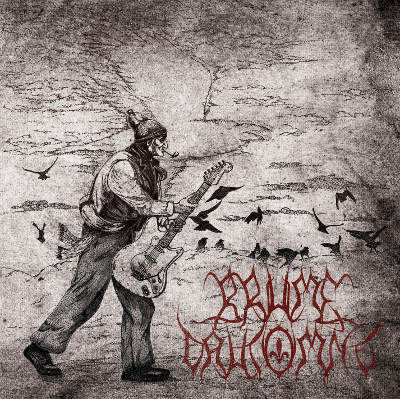
Album Review: Brume d'Automne - Brume d'Automne
Psychology has taught us many things about the human condition, few of which can be applicable to an examination of a black metal album. However, there is one phenomenon that is worth considering. We've learned, through studies, that humans are better able to differentiate between members of their own ethnic/racial group than those of other backgrounds. Likewise, fans of black metal will have no problem identifying Brume D'Automne from every other similar band, and can point to the qualities that make them stand out as a unique entity. Being an outsider to the world of black metal, it is not something I can do. I can see the proverbial forest, but not the trees.
As “Tels De Béliers” spits from the speakers, it is nothing if not raw black metal. A noisy production, with buzzing guitars and muffled drums, the sounds that come through are as ugly as intended. The tremelo riffs that make up the bulk of the song are indistinguishable under the haze of noise, the frantic double-bass drumming nearly inaudible. The song tries to be powerful, but adherence to the black metal aesthetic robs the song of its essential qualities. The slowdown at the end is more effective, letting the atonal guitar harmony be heard well enough to be upsetting.
An oddly placed cowbell rings in “L'Esprit du Courant”, before more similar riffing takes over the song. The difference when the drums slow to a straight beat are noticeable, giving an air of musicality to the sound, replacing the chaotic drone that makes up the bulk of the album. “Rouge Souvenir d'Antant” tries to be different with a few more open chords, but any effect is buried beneath the thin distortion, unable to shake the chains weighing it down. The vocals aren't any help, spending the entire album opposed to finding an interesting rhythmic pattern. The shrieking could be effective at setting a mood, if they fit into the songs, but they sit haphazardly atop the music, never feeling as though they go together. It could be considered a deliberate artistic statement, but I fear that would be giving too much credit.
The biggest problem “Brume D'Automne” suffers is the very nature of black metal; a rigid adherence to an ethos that makes the music impenetrable. So much of the album is made up of drums that never relent, riffs that are more noise than anything else, and vocals that consider versatility a crime, that the end result is academic. The forty minutes pass by without much in the way of variation, subjecting the listener to a never-ending wash of the same thing over and over again, like a time lapse video of the tides eroding the beach. Listening to this album is a similar experience, feeling like a little bit of you has been carried away each time a riff comes and goes.
Even when dealing with music that is outside of one's comfort zone, there is often a sense of quality that can be gleaned from the compositions. You don't have to be immersed in the genre to appreciate the skill and effort it takes to do it well. Black metal can indeed be done well, but “Brume D'Automne” is not evidence to support that argument.

